(66)『資本論』第2巻の編集に苦闘するエンゲルス
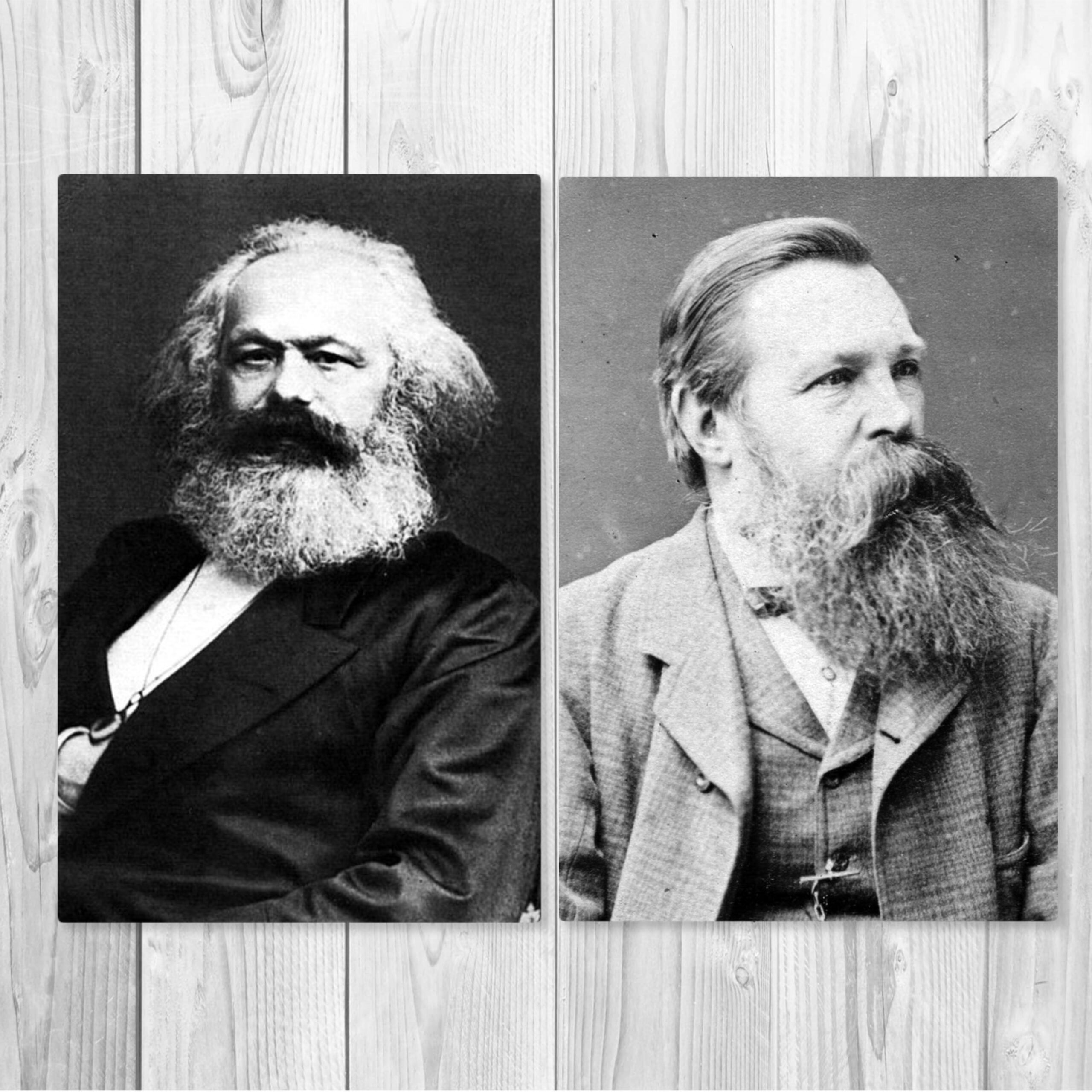
『資本論』第2巻の編集に苦闘するエンゲルス「マルクスとエンゲルスの生涯と思想背景に学ぶ」(66)
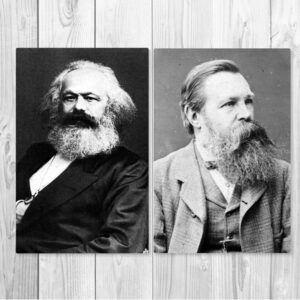
上の記事ではマルクスとエンゲルスの生涯を年表でざっくりとご紹介しましたが、このシリーズでは「マルクス・エンゲルスの生涯・思想背景に学ぶ」というテーマでより詳しくマルクスとエンゲルスの生涯と思想を見ていきます。
これから参考にしていくのはトリストラム・ハント著『エンゲルス マルクスに将軍と呼ばれた男』というエンゲルスの伝記です。
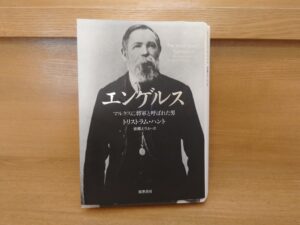
この本が優れているのは、エンゲルスがどのような思想に影響を受け、そこからどのように彼の著作が生み出されていったかがわかりやすく解説されている点です。
当時の時代背景や流行していた思想などと一緒に学ぶことができるので、歴史の流れが非常にわかりやすいです。エンゲルスとマルクスの思想がいかにして出来上がっていったのかがよくわかります。この本のおかげで次に何を読めばもっとマルクスとエンゲルスのことを知れるかという道筋もつけてもらえます。これはありがたかったです。
そしてこの本を読んだことでいかにエンゲルスがマルクスの著作に影響を与えていたかがわかりました。かなり驚きの内容です。
この本はエンゲルスの伝記ではありますが、マルクスのことも詳しく書かれています。マルクスの伝記や解説書を読むより、この本を読んだ方がよりマルクスのことを知ることができるのではないかと思ってしまうほど素晴らしい伝記でした。
一部マルクスの生涯や興味深いエピソードなどを補うために他のマルクス伝記も用いることもありますが、基本的にはこの本を中心にマルクスとエンゲルスの生涯についてじっくりと見ていきたいと思います。
その他参考書については以下の記事「マルクス伝記おすすめ12作品一覧~マルクス・エンゲルスの生涯・思想をより知るために」でまとめていますのでこちらもぜひご参照ください。

では、早速始めていきましょう。
『資本論』第2巻の編集に苦闘するエンゲルス
マルクスの死後、エンゲルスは自分の科学的研究を中断して、友人の著作物の財産整理という非常に困難な仕事を進めなければならなかった。
「文献からの引用文はなんの順序にもなっておらず、それらの山は一緒くたに固まり、単にあとで選べるように集められている。そのうえ、筆跡ときたら間違いなく僕以外の誰にも解読できないもので、それも苦労のあげくに読み取れるものなのだ」と、彼はメイトランド・パーク・ロードに保管された記録をかき分けて進んだあとで、アウグスト・べーべルに途方に暮れたように書いた。
エンゲルスが生涯をマルクスに捧げたことも、彼を失って孤独にならざるをえないことも知っていたので、べーべル、カウツキー、リープクネヒトはみなエンゲルスに、マルクスの葬儀のあとロンドンを離れて、大陸にいる自分たちのもとにくるように促した。
イギリスの低気圧の暮らしに慣れて、それを好むようになっていたエンゲルスは、すげなく断った。
「僕は自分が国外追放になりうる国に行くつもりはない。だが、これはイギリスとアメリカでしか得られない安全なのだ」と、彼は若い弟子たちに告げ、さらにこう述べた。
「論理的な作業をやりつづけるとすれば、それに必要な平穏な暮らしはここでしか得られない」。プリムローズ・ヒルはグローバル共産主義の組織的中心地へと変貌しており、エンゲルスは「マルクスの書斎へ世界各地から自発的に集まってきた多くの流れ」を損なうまいと心に決めていた。
筑摩書房、トリストラム・ハント、東郷えりか訳『エンゲルス マルクスに将軍と呼ばれた男』P389-390
※一部改行しました
マルクスの死後、エンゲルスは中途半端に終わってしまっていた『資本論』を編纂する作業に着手します。

上の記事で述べましたように、エンゲルスは『資本論』第1巻の時点ですでにマルクスの膨大な原稿を編集していました。マルクスが存命の時ですらこの作業に苦戦していたエンゲルスです。
マルクスの死後はどうだったのでしょうか。
その作業は想像を絶する苦難の道となったのでした。
マルクスの『資本論』第2巻の遺稿を見て戦慄するエンゲルス
「こうなるとわかっていたら」と、エンゲルスはべーべルにこぼした。
「昼夜うるさく彼をせっついて、すべてを書き終えさせ印刷させておくのだった」。エンゲルスがマルクスの書斎に入って書類を整理し始めたときに彼が発見し、戦慄と怒りを覚えたのは、『資本論』の待望の第二部が、マルクスのいつもの言い逃れと、ほとんど関係のないテーマへの没頭という弱点と、さらに多くの証拠を集めることへの飽くなきこだわりに屈していたことだった。
意図的にしろ、そうでないにしろ、マルクスは自分の最高傑作を断念していたのだ。
「アメリカとロシアからの資料が大量になければ(ロシアの統計だけでも二立方メートルを超える書籍がある)、第二部はずっと以前に出版されただろう。これらの詳細な研究が何年ものあいだ彼に足止めを食らわせた」。
そのため、マルクスの著作の英語、イタリア語、デンマーク語、フランス語への翻訳を監修する作業に加えて(「原書により忠実になるように」と、エンゲルスは『哲学の貧困』に苦戦するラファルグを叱りつけた。「マルクスは自分の原稿を勝手に変更させるような男ではない」)、エンゲルスは『資本論』の第二部、第三部のドイツ語版の監修にも乗りだした。
筑摩書房、トリストラム・ハント、東郷えりか訳『エンゲルス マルクスに将軍と呼ばれた男』P390-391
※適宜改行しました
ここを読んでわかりますように、マルクスは自身の『資本論』完成に完全に行き詰まっていたのです。
だからこそマルクスはそこから逃れるためにロシアの研究に没頭していたという側面があったのでした。(これすらもやはり行き詰っているのですが・・・)

『資本論』第2巻、第3巻は一応はマルクスの著作とされていますがはたしてそう考えていいのかすら微妙なように私には思えてしまいます。
眼を痛めながら解読し、編集に励むエンゲルス
リージェンツ・パーク・ロードの自分の書斎で、一八八三年の夏から一八八五年の春まで、彼は無数の書き直しと統計図表、途切れた思想の筋道と理解不能なメモを照合し解読する作業に熱心に取り組み、それがドイツ語版『資本論』の第二部、「資本の流通過程」となった。
それは骨の折れる苛立たしい作業だったが、エンゲルスは「この本に取り組んでいるあいだは、彼[マルクス]と交流しながら生きていると、本当に言える」感動を大いに楽しんだ。
昔の同志との対話は楽しいものではあったが、マルクスの不可解な悪筆を一行一行編集する作業は、エンゲルスの健康を脅かしていた。
そして、エドワード・エイヴェリングによれば、原稿はひどい状態にあった。「推測するしかない略字があり、線で消された部分や数えきれないほどの訂正を解読しなければなりません。紐で括られたギリシャ語のパリンプセスト〔以前の文章が不完全に消されて再利用された羊皮紙など〕を読むくらい困難なものです」。
一八八〇年代なかばには、エンゲルスの目は酷使されて衰弱しており、結膜炎や近眼が進む兆候が見られるようになった。
負担を軽滅するために、彼は若い世代にマルクスの筆跡の象形文字的な謎を教え込まざるをえなくなった―「二人の有能な紳士、カール・カウツキーとエドゥアルト・べルンシュタイン―が、やがてドイツの社会主義者の植字工、オスカル・アイゼンガルテンを雇い、口述筆記をさせるようになった。
しかし、エンゲルスはそれでもマルクスの原稿の見直しをしなければならず、一八八七年には慢性の眼炎を患うようになった。そのため自然光のもと以外では、読むのがきわめて困難になった。
ありがたいことに、試行錯誤を繰り返したあとで、科学志向のエンゲルスは治療法を見つけた。「昨年からこの八月まで、僕はコカインを使ったが、この効果が薄れてきた(慣れが生じたため)ので、ZnCl2〔塩化亜鉛〕に変えてみたところ、これがたいへんよく効く」と彼は友人の医師であるルートヴィヒ・クーゲルマンに告げた。
しかし、老化の進む身体のことで彼が本当に心配していたのは、ある医師からの警告だった。「僕はもう二度と馬に乗れそうもない―ということは、戦地勤務には適さない、なんということだ!」
筑摩書房、トリストラム・ハント、東郷えりか訳『エンゲルス マルクスに将軍と呼ばれた男』P391-392
※一部改行しました
エンゲルスの涙ぐましい奮闘が目の前に現れてくるようです。
解読作業があまりに困難なため眼を患ってしまったというのは恐ろしい話ですよね。そこまでしてマルクスの『資本論』第2巻を世に出そうとしたエンゲルスの恐るべき執念を感じます。
『資本論』第2巻の完成と、この作品の弱点
勤勉な性格どおりに、エンゲルスは一八八五年五月に『資本論』の第二部を刊行した。マルクスの死からわずか二年後のことだった。
その出版によって、エンゲルスはお馴染みの一連のブルジョワの批評家―なかでもマルクスが盗用したとして非難していたドイツの経済学者ヨハン・カール・ロードべルトゥス―にたいする闘争をつづけることができ、再びマルクス主義と余剰価値の理論を十九世紀の科学のパラダイム・シフトの一部として位置づけられるようになった。
「マルクスは、ラヴォワジエがプリーストリーやシェーレに対峙したように、余剰理論で先駆者たちと同様の関係にある」と、エンゲルスの序文は宣言し、彼のお気に入りの科学分野のたとえを使った。
「われわれがいま余剰価値と呼ぶ、生産物の価値のなかのその部分の存在は、マルクスよりずっと以前から突き止められてきた……。しかし彼ら[過去の経済学者たち]はそれ以上に探究することはなかった……。マルクスはこれを〈脱燃素化した空気〉でもなければ、〈火の空気〉でもなく、酸素によるものだと考えたのだ」。
しかし、第二部が取り組んでいなかったのは、一八六七年にエンゲルスが最初に気づき、マルクスがあとで答えると約束していたもの、すなわち不変資本(機械設備)が余剰価値を通して利益を生みだせるのかという問題であり、またどんな工場でも可変資本と不変資本の割合(労働と機械設備)が異なることを考えると、異なった資本で利益率はどのように決まりうるのかという疑問である。
言い換えれば、メグナド・デサイが表現したように、「(非労働)資本は利益性と関連するのかどうか?」である。
この難問を解く代わりに、エンゲルスは問題を弱々しくマルクスの批判者たちに投げ返した。「いかに同等の平均的利益率をもたらすことが可能で、またそうでなければならないかを彼らが示せれば、価値の法則に反することがないばかりか、まさにその土台の上で、われわれは彼らとともにこの問題をさらに議論したいと思う」
筑摩書房、トリストラム・ハント、東郷えりか訳『エンゲルス マルクスに将軍と呼ばれた男』P391-392
※一部改行しました
『言い換えれば、メグナド・デサイが表現したように、「(非労働)資本は利益性と関連するのかどうか?」である。
この難問を解く代わりに、エンゲルスは問題を弱々しくマルクスの批判者たちに投げ返した。「いかに同等の平均的利益率をもたらすことが可能で、またそうでなければならないかを彼らが示せれば、価値の法則に反することがないばかりか、まさにその土台の上で、われわれは彼らとともにこの問題をさらに議論したいと思う」』
ここで明らかなように『資本論』第2巻では第1巻の根本的な問題は解決されず、エンゲルスはまさかの開き直りを見せることになります。そしてこの問題は第3巻でも結局解決されることはありませんでした。
マルクスの理論は実は成立していないというのが実際のところだったのです。
ですがそれもそのはず。そもそも『資本論』第2巻、第3巻は第1巻より前に書かれていたのです。このことについては以前紹介した「マルクス『資本論』の執筆の流れをざっくりと解説!「マルクスとエンゲルスの生涯と思想背景に学ぶ」(50)」の記事で次のようにお話ししました。
。

マルクスは一八六〇年代前半に経済学に関する著作の執筆を精力的に行い、一八六一~六二年には以前よりも構成がしっかりした著作全体の草案を作り出した。
そこに含まれていた、後年の原稿には見出すことのできない経済思想の歴史に関する部分は、最終的に『剰余価値学説史』として別個に出版された。
第三の、そして最もよく練り上げられ最も明快な著作は、一八六四~六五年に書かれた。
一度に出版するには大部になりすぎたので、マルクスは最初の四割を抜き出して、それを出版のために大幅に改訂した。これが『資本論』の第一巻となり、一八六七年にハンブルクで出版された。
一八七〇年代、マルクスは一八七三年のドイツ語第二版、そしてその二年後に出されたフランス語版〔ドイツ語第二版の刊行時期は一八七二~七三年、フランス語版は一八七二~七五年〕のために、この著作に大量の変更と修正を施した。翻訳者と出版者を獲得しようと努力したものの、英語版が出版されたのはようやく一八八七年、彼の死後のことであった。
これらの出版にもかかわらず、マルクスが計画していた著作の大部分はなお未刊行のままであった。
マルクスは第一巻が出た直後に作品を完成させたいと思っていたが、他界する年までこの仕事を続けることになった。しかし一八六七年以降の成果はばらばらの状態にとどまった。
マルクスの死後、彼の著作を収集して整理し清書したエンゲルスは、一八六〇年代以来の複数の草稿を参照しなければならなかった。
『資本論』の第二巻と第三巻は、エンゲルスの編集でそれぞれ一八八五年と一八九四年に刊行されたが、実際には第一巻の大半は第二巻と第三巻の〔原稿が執筆された〕後に書かれており、そこには多くの重要な問題に関するマルクスの最終的な思想と定式が含まれている。
白水社、ジョナサン・スパーバー、小原淳訳『マルクス ある十九世紀人の生涯』下巻P165-166
※一部改行しました
『資本論』第2巻、第3巻は第1巻発表の前にすでに書かれていたというのは驚きですよね。
すでに大部の『資本論』ができていてその前半4割を第1巻とし、それを清書して出版したのが『資本論』第1巻だった・・・
よく聞くのは「『資本論』第1巻で矛盾点や問題点に対する指摘が多かったため、それに答えようとマルクスは第2巻、第3巻を書こうと奮闘したが命を終えてしまった」というものです。
たしかにそういう面もあるにはあるのですが実際は第2巻以後もすでに書かれていました。そしてそれを出版するには不完全すぎるとマルクスが考えた結果、どうにかならぬかと悩み続けるも満足するものはできず、そのままお蔵入りになってしまったというのが一番近いのではないでしょうか。
「マルクスは数多くの遺稿を残し、そこには明確な思想、答えがあり、それは現在でも通用する」と現代のマルクス主義者は語りますが、それはちょっと厳しいのではないかと上の箇所を読み思ってしまいました。
エンゲルスの伝記でも後に出てきますが、『資本論』第1巻出版後のマルクスは思想的に完全に行き詰まっていたのです。だからこそマルクスはいつものごとく図書館に籠り、様々なジャンルの本を読み漁り、それを大量にメモして残すことになります。そのひたすら読み漁っていた記録メモを「マルクスの真の思想」として蘇らそうとしているのが現代のマルクス主義側の立場なのかもしれません。
Amazon商品ページはこちら↓
次の記事はこちら
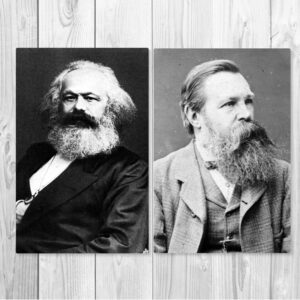
前の記事はこちら
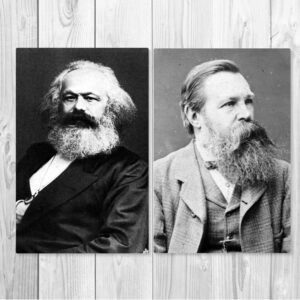
関連記事
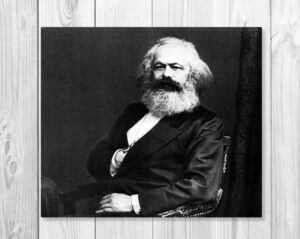

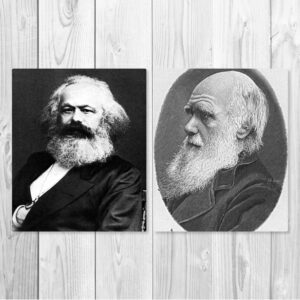


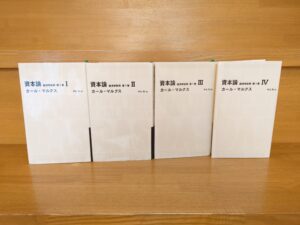
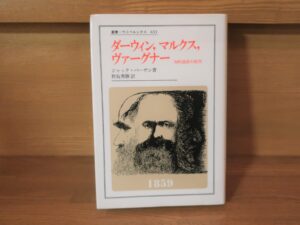

コメント